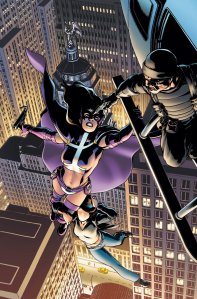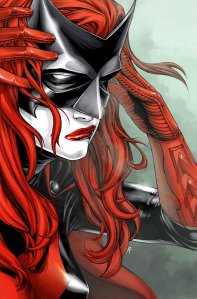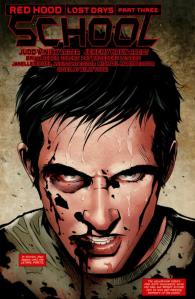Getting There
The former DC editor talks getting more women into comics: not just reading, but writing and editing them, too.
Elisabeth Pfeiffer
 By this point, Janelle Asselin should be a recognizeable name if you’re into comics at all. The former DC Comics editor, now a children’s magazine editor with Disney, took on the perceptions that mainstream comic publishers seem to hold as truth: that women just don’t read comics and a majority of women won’t read comics. In her thesis, she looked at the role of content, perceptions of gender, and the role of marketing in what draws and repels women to and from comics – all of which can be found at ladydrawers.wordpress.com
By this point, Janelle Asselin should be a recognizeable name if you’re into comics at all. The former DC Comics editor, now a children’s magazine editor with Disney, took on the perceptions that mainstream comic publishers seem to hold as truth: that women just don’t read comics and a majority of women won’t read comics. In her thesis, she looked at the role of content, perceptions of gender, and the role of marketing in what draws and repels women to and from comics – all of which can be found at ladydrawers.wordpress.com
Ms. Asselin, who started at DC Comics in 2008 and left for Disney in September 2011, offered suggestions to comic publishers to increase those sales. She told the DCWomenKickingAss blog in a January 31, 2012 post that, “The primary conclusions I made from my research are that there are four different ways the comics industry can adjust to increase sales to an often excluded demographic that just happens – oh yeah – to make up over 50% of America. Those four ways are better marketing towards women, more inclusive content, more effective distribution, and changing the cultural preconceptions of comics.”
Those might seem like really simple ideas, but whether or not comic publishers have approached the former DC editor to expand their current market geared towards 18-34 -year-old men is another thing all together. So that’s why we went ahead and asked her! Ms. Asselin shares with us what has happened since her thesis was published, how she got into comics, and gives some tips for those who’d love to see themselves working in her old job someday. (Hint: keep the word ‘aspiring’ off your resume!)
How did you get into comics? What was that one story you read that made you think, damn, I love this medium?
I have two older siblings (and one younger) and they influenced me in a lot of things like movies, music, books, etc. When I was 9ish, the 90s X-Men cartoon was airing and I got really into it. My older sister worked at Pizza Hut at the time and she got me the promotional X-Men Adventures comics they were giving out with kids’ meals. Then I discovered my brother had a couple comics on the shelf at home – it was a weird assortment, though. A Spider-Man OGN called Spider-Man: Hooky and the Creepshow collection were the ones that still stand out to me (both drawn by Bernie Wrightson!). Then a couple months later, I bought my own comics and got hooked for about a year! Then I stopped reading until I was 19.
The one story that really changed how I felt about comics was the first Echo storyline in Daredevil, written and drawn by David Mack. I’d been reading comics again for about a year and a half but had mostly stuck to X-titles and Spider-Man because that was the stuff I’d known as a kid and I was really passionate about those characters. But my ex was buying all these comics and they were just sitting around the apartment, so I started devouring basically every comic we had. When I got to that storyline in Daredevil, I really did feel like it changed my life. It was some of the most beautiful art I’d ever seen and I don’t think anyone, regardless of their feelings on comics, could deny that it’s “true” art. It made me rethink what the medium was capable of and for the first time, I thought about the world beyond super hero comics. I also thought about how the things I’d considered as “givens” about super hero comics were maybe not necessary (like female characters usually taking a back seat to the male characters).
 What led you to your (former) position as an editor at DC Comics?
What led you to your (former) position as an editor at DC Comics?
As I mentioned, I was a big X-Men geek. At Wizard World Chicago in like 2005, I had a conversation with the lead editor on the X-books, a Mr. Mike Marts, about how to become a comics editor. Mike and I stayed in touch over the years as I built my resume and gained editing and comics experience. I worked at Newsarama doing comic reviews and line editing articles, I was the co-host on a podcast that covered geek culture, and I worked at Fangoria Comics as an assistant editor. And when I finally decided to risk a move to NY to try to get a job at DC or Marvel, it just so happened that there were some openings at DC. I interviewed for a couple of them and was hired to be Mike’s assistant editor.
One of my favourite essays in Chicks Dig Comics was Rachel Edidin’s “The Other Side of the Desk.” Personally, I loved it as a journalist and a copy editor. Rachel says as an editor, she takes on many roles – a midwife, a roadie, a producer, a gardener: what grows is not her creation, but she “can cultivate it, fertilize and nurture and prune it until it reaches heights and takes shapes far beyond what it could have reached wild.” Do you feel that this is an apt description of your role as an editor? What is it that you love about editing comics?
I would add in “babysitter.” Haha! Seriously, though, I think it’s a great description. The truth is that for editors, it’s all about being a part of the process, not being the one who gets the credit for the finished product. Editors are like midwives, roadies, producers, gardeners in that when those people do their jobs best, you never know they were there at all. It can be difficult to labor over something and get no credit – or worse, only get “credit” when something goes wrong – but that’s the lot of editors. And at the end of the day, that’s actually what I love about being an editor. Working with creative people is sometimes a struggle, but to be able to look at something they’ve created with your help and know that in the best of circumstances, no one will ever even see the work you labored over BECAUSE of how you labored over it, is actually intensely rewarding. At least, it is for me!
I recall, and I hope I’m stating this accurately, that one of the comments you made regarding women writing in comics is that you would love to see more women, but you just don’t receive the sheer number of pitches from women as men. As an editor, do you have tips that would help aspiring women creators to get their pitches to the editor’s desk?
Yep, that’s definitely something I said! In my time at DC, exactly one woman reached out to me via email, and I hired her. I didn’t hire her BECAUSE she was a woman, I hired her because she was good, of course. But in that same amount of time, probably at least two or three men a week contacted me looking for work, some of them intensely pushy and many of them decidedly not good. I think more female creators should put themselves out there. The numbers are growing, we all can see that, especially in indie comics and comics published by traditional publishers, but if there are women who want to work on super hero books, they need to speak up. The question I usually get after saying that, though, is “but how am I supposed to speak up when those companies don’t accept submissions?” And that’s an important thing!
 Because submissions are different from “hey, this is what I do! I’d love to work for you!” Companies like Marvel and DC don’t accept unsolicited submissions for legal reasons and there’s no getting around that, but that doesn’t mean you can’t chat up editors. Sending an email with a link to your portfolio (definitely do NOT send large attachments – nothing would get me to delete your email more quickly because that inbox space is needed for incoming art!) or a quick list of stuff you’ve worked on is totally acceptable. Don’t overstep your bounds by being too pushy, but tell them what you do and express your interest in working for them. If you have something they like or need, they might try you out. Then your foot is in the door and you can talk to them about pitching.
Because submissions are different from “hey, this is what I do! I’d love to work for you!” Companies like Marvel and DC don’t accept unsolicited submissions for legal reasons and there’s no getting around that, but that doesn’t mean you can’t chat up editors. Sending an email with a link to your portfolio (definitely do NOT send large attachments – nothing would get me to delete your email more quickly because that inbox space is needed for incoming art!) or a quick list of stuff you’ve worked on is totally acceptable. Don’t overstep your bounds by being too pushy, but tell them what you do and express your interest in working for them. If you have something they like or need, they might try you out. Then your foot is in the door and you can talk to them about pitching.
Also, never describe yourself as an “aspiring” anything. You’re either doing it or you’re not – just own it. Saying to an editor that you’re an “aspiring comic writer” or “aspiring comic artist” gives them the impression you’re an amateur.
As an editor, what kind of control did you or can you have over some of the issues regarding the portrayal of women in comics? If a female character was drawn or written in a way that made her more of a, as you’ve said, ‘sexy cardboard cut-out’, were you able to offer any suggestions to the writer or artist or discuss with them why they were portraying the character in that way?
It depends. Unfortunately, in the great machine that is DC, I was merely a small cog and as such, I had to pick my battles. It’s easier to fight the little things than the big things, really. For instance, I did a lot of looking for unrealistic clothing and asking artists to adjust.
I once had to explain to an artist that just because he’d drawn a character’s skirt being blown up didn’t mean he didn’t have to draw it long enough to cover her ass. And I had to argue good-naturedly with a writer about a chocolate-related plot point because I felt it was sexist and he disagreed. The chocolate plot point revolved around how chocolate is a weakness for women and it was used to trap a female character. I mentioned I was concerned that this was making the normally tough character seem weak simply because of stereotypes about a gender (the character involved really didn’t seem to me to be the type to succumb to such things) and the writer said there’d been research that women want chocolate more than men. We went back and forth a few times but ultimately my boss said if it were making me uncomfortable than it would also probably make some readers uncomfortable so we should just change it. Luckily, for every argument that arose from those discussions (and even most of those weren’t hostile), I usually had multiple creators who actively sought my feedback on the portrayal of their female characters.
But at the end of the day, the little things were easier because those were usually between me and the creators involved. Once you got bigger and got into story arcs, books, and creator choices, some of those were just completely out of my hands. If portraying women accurately and in a nonsexist manner isn’t a concern all the way to the top of an organization, it makes it harder for those in the trenches to fight the good fight. Doesn’t mean it’s not worth fighting, just that it’s difficult.
It’s been more than six months since you’ve finished your thesis on Women and Comics. Have you seen any progress following your suggestions?
I haven’t noticed any companies in particular following my suggestions, but since I’ve been working on turning my thesis into a book, I’ve had multiple people at comics publishers contact me to talk about their interest. There are more publishers than even I would’ve expected that want to know more about how they can get more women reading their books.
You mentioned in your interview with Sue of DCWomenKickingAss that you’d like to see a 25% increase in women reading comics. With the ongoing Womanthology, and other books like Saga and The Walking Dead, and some of the mainstream offerings like Wonder Woman, Birds of Prey, Batwoman, Earth 2, and Captain Marvel, do you see these as potential evidence that the industry is starting to change?
The industry is definitely starting to change. It’s been changing, slowly, for a long time, really. It’s easy to get frustrated at the slow speed of that change, but it is certainly better than nothing. Still, I think a lot of the projects you mention, while projects that the women already reading comics are passionate about aren’t necessarily the sort of things that will bring new female readers in, with the exception of The Walking Dead. They need to be done, don’t get me wrong – and we need dozens and dozens more like them – but we need more books that will draw in women who don’t ordinarily read comics.
 One of the things I’ve noticed over the past several years is that the voices of women who love comics are only getting louder. From petition drives, to blogs, to attending comic conventions and asking editors direct questions, women who love this medium are trying to get some recognition from it and enact change. As you were working on your thesis, did it seem to you that the industry was starting to listen to what women have to say or did many still say they felt ignored?
One of the things I’ve noticed over the past several years is that the voices of women who love comics are only getting louder. From petition drives, to blogs, to attending comic conventions and asking editors direct questions, women who love this medium are trying to get some recognition from it and enact change. As you were working on your thesis, did it seem to you that the industry was starting to listen to what women have to say or did many still say they felt ignored?
Unfortunately, I think most of the women I spoke to did still feel ignored. But I think a lot of that had to do with the fact that I was giving them a safe space to talk about how the industry made them feel and that naturally brings out the concerns people have. In the survey I did, many people said they thought the industry was getting better than it used to be in regards to women. When I spoke with women who had been in the industry for a long time, they talked about the improvements but also the continued frustrations. One such woman told me that she didn’t have the energy to fight the fight anymore and was hoping people like myself would keep it going. It does wear people down.
And now for some softball questions! Who are some of your favourite writers and artists?
Oh goodness I could go on forever. I apologize in advance to any delightful people I love that I forget! Some faves: Brian K. Vaughan, Paul Cornell, Duane Swierczynski, Trevor Scott, Katie Cook, Jesus Saiz, Jamie McKelvie, Lora Innes, Dustin Nguyen, Fiona Staples, Amy Reeder, Jeremy Haun, Christina Strain, Ryan Kelly, Kate Beaton, Derek Fridolfs, Guy Major, Chris Yost, Andy Clarke, Emi Lenox… seriously, I could keep going.
What are some of the books you’re reading now?
My regular pulls are Saga, Saucer Country, and Birds of Prey. I’ll admit that I stopped reading monthly comics for a while after leaving DC just because it was hard to read the stuff I’d worked on. I’m looking forward to the new Captain Marvel, Bandette, and Molly Danger, and I’m about to start reading Are You My Mother? and the first Finder omnibus.
And finally, is there anything else you would like to add?
It’s a tough industry to be a woman in, but I know we’re all trying to make our place here because we love the medium. It’s exhausting to fight the fight day in, day out. Even among our own gender we may not all agree. But the fact is, we love comics and there’s no reason this industry can’t be a friendly place for people of all types. That’s not something any of us should lose sight of. I know I get discouraged from time to time when it’s like “urrrgh, nothing’s changed!” but it’s a worthwhile fight.
Thanks for the great interview, Janelle! You can find Janelle on Twitter at @gimpnelly and Tumblr gimpnelly.tumblr.com.
